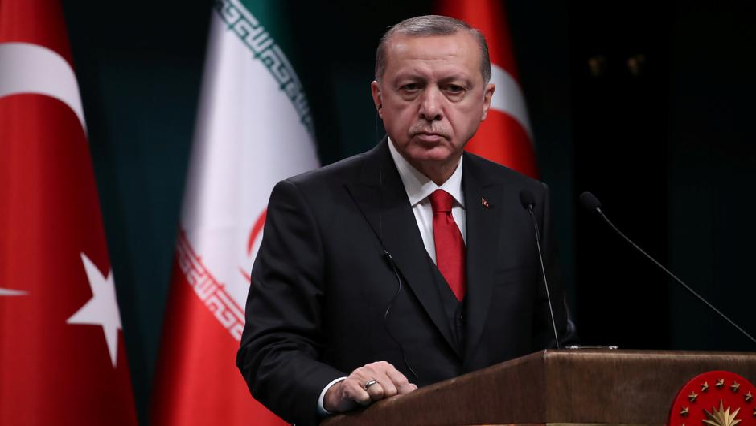Turkish President Tayyip Erdogan said on Saturday he had asked President Vladimir Putin for Russia to stand aside in Syria and let Turkey deal with Syrian government forces alone, after 34 Turkish soldiers were killed this week.
Syrian government forces, backed by Russian air power, have waged a major assault to capture the northwestern province of Idlib, part of the last remaining territory held by rebels backed by Turkey.
Syrian and Russian warplanes on Saturday kept up air strikes on the Idlib city of Saraqeb, the Syrian Observatory war monitor reported. The strategic city sits on an important international roadway and has been a flashpoint of fighting in recent days.
Turkish strikes using drones and smart missiles late on Friday hit Hezbollah headquarters near Saraqeb, killing nine of its members and wounding 30 in one of the bloodiest attacks on the Iran-backed group in Syria, according to a commander in the regional alliance backing Damascus.
The Syrian Observatory said renewed Turkish drone strikes on Saturday killed 26 more pro-Damascus troops around Idlib and the Aleppo countryside, bringing the death toll for Syrian government forces and their allies to 74 since Friday.
Turkey-backed rebels meanwhile said they had re-taken six towns and villages on Saturday in the Jabal Zawiya area of southern Idlib, reclaiming a small pocket of the province after fierce clashes with Pro-Assad forces.
With diplomacy sponsored by Ankara and Moscow to ease tensions in tatters, Turkey has come closer than ever to confrontation with Russia on the battlefield in Syria.
Speaking in Istanbul, Erdogan said he had told Putin in a phone call to stand aside and let Turkey “do what is necessary” with the Syrian government. He said Turkey did not intend to leave Syria right now.
“We went there because we were invited by the people of Syria. We don’t intend to leave before the people of Syria say, ‘Okay, this is done,'” Erdogan added.
As tensions rose, three rounds of talks between Russia and Turkey failed to yield a ceasefire.
Russia’s Foreign Ministry said on Saturday the two sides agreed in this week’s talks to reduce tensions in Idlib while continuing military action there.
But Turkish Foreign Minister Mevlut Cavusoglu told reporters in Doha the Idlib issue can be settled only in a meeting between Erdogan and Putin, which he said would take place on March 5 or March 6.
Following a meeting with U.S. Secretary of State Mike Pompeo, Cavusoglu said Turkey wanted the United States to send Patriot missile systems as support in Idlib. Ankara has previously voiced the request, saying it faced air missile threats in the region.
A U.S. State Department official told reporters on Friday that Washington was looking urgently to support Ankara in Idlib with information-sharing and equipment, but that any assistance would not involve military moves by American units.
MIGRANTS
After 33 of its soldiers were killed on Thursday, Turkey said it would allow migrants it hosts to freely pass to Europe. One more Turkish soldier was killed on Friday, raising this month’s toll to 55.
Turkey hosts some 3.7 million Syrian refugees, in addition to Afghans, Iranians, and Moroccans among others. It has said it cannot take another refugee wave from Idlib.
Violence in Idlib has displaced 1 million civilians since December inside the country near the Turkish border in desperate winter conditions.
Erdogan said 18,000 migrants has crossed the border to Europe from Turkey since the gates were opened, without providing evidence, and that the number could rise to 25,000-30,000 on Saturday.
Greece and Bulgaria, both European Union member states neighbouring Turkey, said they would not admit the migrants. Greek police fired teargas towards migrants gathered on its border with Turkey and demanding entry on Saturday.
“The European Union needs to keep its promises. We don’t have to take care of this many refugees, to feed them,” Erdogan said.
He said funds transferred to Turkey from the EU to support refugees were arriving too slowly and that he had asked German Chancellor Angela Merkel to send the funds directly to the Turkish government.
Turkey’s borders to Europe were closed to migrants under an accord between Turkey and the EU that halted the 2015-16 migration crisis when more than 1 million people crossed into Europe by foot.
Bulgarian Prime Minister Boyko Borissov said he was planning to host a high-level meeting to seek long-lasting solutions for Syria and migrants, and that he will meet Erdogan on Monday.
He said there was currently no migration pressure on the Balkan country’s border with Turkey.
Charles Michel, President of the European Council, Europe’s main human rights watchdog, expressed concern about the “untold human suffering” in Idlib in a phone call with Erdogan.


